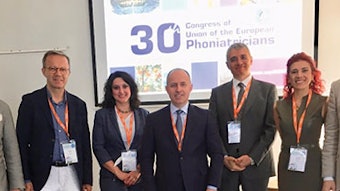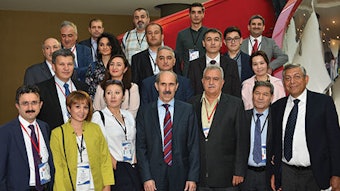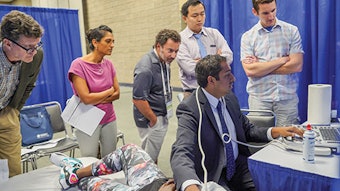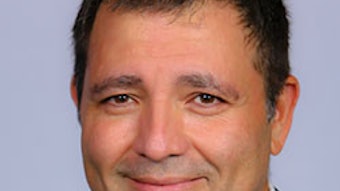Out of Committee: OREBM Publication Highlights
In the Publication Highlights, The AAO-HNSF Outcomes Research and Evidence Based Medicine (OREBM) Committee notes articles that may alter surgical practice. The 2017 study: “A Comparison of Alkaline Water and Mediterranean Diet vs Proton Pump Inhibition for Treatment of Laryngopharyngeal Reflux,”
Laryngopharyngeal reflux
Study finds PPI therapy is not significantly more effective in reducing patient-reported symptoms and severity compared to a sole dietary approach.
Elisabeth Ference, MD; Karla F. O’Dell, MD; Vikas Mehta, MD, MPH
 LPR involves the reflux of gastric contents into the upper airway where acid, bile, and pepsin lead to inflammation and symptoms including cough, throat clearing, mucus sensation, globus sensation, and hoarseness.
LPR involves the reflux of gastric contents into the upper airway where acid, bile, and pepsin lead to inflammation and symptoms including cough, throat clearing, mucus sensation, globus sensation, and hoarseness.In the Publication Highlights, The AAO-HNSF Outcomes Research and Evidence Based Medicine (OREBM) Committee notes articles that may alter surgical practice. The 2017 study: “A Comparison of Alkaline Water and Mediterranean Diet vs Proton Pump Inhibition for Treatment of Laryngopharyngeal Reflux,”1 challenges the use of proton pump inhibitors (PPIs) for the treatment of laryngopharyngeal reflux (LPR).
LPR involves the reflux of gastric contents into the upper airway where acid, bile, and pepsin lead to inflammation and symptoms including cough, throat clearing, mucus sensation, globus sensation, and hoarseness. Previously, LPR has been estimated to be responsible for up to 10 percent of visits to otolaryngology offices, with an annual cost of diagnosis and treatment of over $50 billion dollars.2–4 The majority of the expense is from the use of PPIs, which also have been linked to adverse reactions ranging from abdominal pain, nausea, diarrhea, and constipation to increased association with myocardial infarction.5 There is continued controversy over the diagnostic workup as well as the treatment algorithm for LPR.
The study was conducted as a retrospective chart review of all patients diagnosed with LPR or with LPR with dysphagia, dysphonia, or cough from 2010 to 2015 at a single institution. Patients were identified from the electronic medical record system using ICD-9 codes. The cohort from 2010 to 2012 were treated with either esomeprazole twice daily or dexlansoprazole daily and standard reflux diet and precautions, which prohibited coffee, tea, chocolate, soda, alcohol, and greasy, fried, fatty, or spicy foods. The second cohort from 2013 to 2015 were treated with alkaline water (pH > 8.0) as a pH level greater than 8 has been shown to inactivate pepsin and a plant-based Mediterranean style diet due to the diet’s low animal protein intake potential to decrease the gastric load of amino acids and subsequently lower pepsin activity. They also were instructed on standard reflux precautions. Inclusion criteria included pretreatment Reflux Symptom Index (RSI) greater than 10 and documentation showing compliance with treatment regimen. Exclusion criteria included confounding diagnoses such as other causes of dysphonia, neuropathic cough, allergic rhinitis, sinusitis, history of laryngeal cancer or radiation, and active smoking.
A total of 184 patients were identified who underwent one of the treatment regimens. Using a six-point improvement in RSI score as response to treatment, patients in the PPI cohort did not experience a response to medication that was statistically better or worse than patients in the alkaline water and diet cohort at six weeks (54 percent of patients in the PPI group versus 62.6 percent in the diet group; differences in proportion 8.05; 95 percent CI -5.74 to 22.76). The mean percent reduction in RSI score in the PPI cohort was significantly less than the improvement in RSI score in the alkaline water and diet cohort (27.2 percent versus 39.8 percent, respectively; difference 12.10; 95 percent CI 1.53 to 22.68).
Findings and recommendations
The findings of this study suggest that treatment with PPI therapy is not significantly more effective in reducing patient-reported symptoms and severity compared to a sole dietary approach. The percent improvement in patient reported symptoms and severity may be greater with the dietary approach compared to PPI therapy. While the RSI is a validated tool, there is no standard to determine the clinical importance of a given percent reduction in scores and the scores are subjective in nature. This study was also limited by its retrospective nature and lack of randomization, as well as limitations inherent to chart review data (information bias, selection bias, exclusion bias, and confounding). Furthermore, the diagnosis of LPR was not confirmed with pH testing. Adherence to PPI or diet therapy among patients was not collected or assessed in a standardized manner leading to potential recall bias. The authors also acknowledge that weight loss is a potential confounding factor, which was not controlled for through the study methods or statistical analysis.
In an era of rising medical costs and when patients are increasingly concerned regarding side effects of long-term medication usage, it would be ideal to offer patients a dietary-based solution to a common diagnosis, especially a diet that could have a lot of additional health benefits. However, these findings would need to be confirmed by a prospective, randomized trial prior to widespread acceptance of its efficacy for LPR treatment.
REFERENCES
- Zalvan CH, Hu S, Greenberg B, Geliebter J. A Comparison of Alkaline Water and Mediterranean Diet vs Proton Pump Inhibition for Treatment of Laryngopharyngeal Reflux. JAMA Otolaryngol Neck Surg. 2017;143(10):1023. doi:10.1001/jamaoto.2017.1454.
- Koufman JA. The otolaryngologic manifestations of gastroesophageal reflux disease (GERD): a clinical investigation of 225 patients using ambulatory 24-hour pH monitoring and an experimental investigation of the role of acid and pepsin in the development of laryngeal injury. Laryngoscope. 1991;101(4 Pt 2 Suppl 53):1-78. http://www.ncbi.nlm.nih.gov/pubmed/1895864. Accessed March 2, 2019.
- Francis DO, Rymer JA, Slaughter JC, et al. High Economic Burden of Caring for Patients With Suspected Extraesophageal Reflux. Am J Gastroenterol. 2013;108(6):905-911. doi:10.1038/ajg.2013.69.
- Carroll TL, Werner A, Nahikian K, Dezube A, Roth DF. Rethinking the laryngopharyngeal reflux treatment algorithm: Evaluating an alternate empiric dosing regimen and considering up-front, pH-impedance, and manometry testing to minimize cost in treating suspect laryngopharyngeal reflux disease. Laryngoscope. 2017;127 Suppl 6:S1-S13. doi:10.1002/lary.26806.
- Shah NH, LePendu P, Bauer-Mehren A, et al. Proton Pump Inhibitor Usage and the Risk of Myocardial Infarction in the General Population. Guo Y, ed. PLoS One. 2015;10(6):e0124653. doi:10.1371/journal.pone.0124653.










